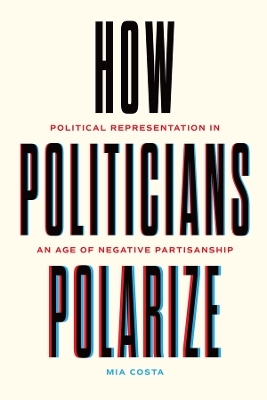
How Politicians Polarize
University of Chicago Press (Verlag)
978-0-226-83894-6 (ISBN)
- Noch nicht erschienen (ca. März 2025)
- Versandkostenfrei
- Auch auf Rechnung
- Artikel merken
What does representation look like when politicians focus on "othering" the opposing party rather than the policy interests of their constituents? How do voters react to negative partisan rhetoric? And is policy responsiveness still the cornerstone of American representative democracy?
In How Politicians Polarize, Mia Costa draws on survey experiments, analysis of congressional newsletters and tweets, and data on fundraising and media coverage to examine how and why politicians rely so often on negative partisan attacks. Costa shows that most Americans do not like negative rhetoric, and politicians know this. Nonetheless, these kinds of attacks can reap powerful rewards from national media, donors, and party elites. Costa’s findings challenge the popular notion that Americans are motivated more by their partisan identities than by policy representation. Her research illuminates how the political ecosystem rewards negative representation and how this affects the quality of American democracy.
Mia Costa is assistant professor in the Department of Government at Dartmouth College, where she is also a faculty associate in the Program in Quantitative Social Science. She has published articles in the American Journal of Political Science, Politics & Gender, Political Research Quarterly, and Political Behavior, among others.
Chapter 1. How Politicians Polarize
Chapter 2. Reinterpreting Representation for an “Us versus Them” Politics
Chapter 3. Partisanship and Policy in Elite Communication
Chapter 4. How Negative Representation Diminishes Substantive Representation
Chapter 5. Negative Partisanship as an Electoral Strategy
Chapter 6. The Hidden Layer of Polarization: Elite Animosity
Chapter 7. Reaping the Rewards: Media, Money, and Influence
Chapter 8. Americans Don’t Like Negative Representation
Chapter 9. Selective Tolerance: The Subgroups That Turn a Blind Eye
Chapter 10. The Perception Gap
Chapter 11. The Race to the Bottom (and the Way Back Up)
Acknowledgments
Appendixes
Appendix to Chapter 3
Appendix to Chapter 4
Appendix to Chapter 7
Appendix to Chapter 8
Appendix to Chapter 9
Notes
References
Index
| Erscheint lt. Verlag | 24.3.2025 |
|---|---|
| Reihe/Serie | Chicago Studies in American Politics |
| Zusatzinfo | 55 halftones, 35 line drawings, 14 tables |
| Sprache | englisch |
| Maße | 152 x 229 mm |
| Gewicht | 454 g |
| Themenwelt | Geisteswissenschaften ► Geschichte |
| Sozialwissenschaften ► Ethnologie | |
| Sozialwissenschaften ► Politik / Verwaltung ► Politische Systeme | |
| Sozialwissenschaften ► Politik / Verwaltung ► Politische Theorie | |
| Sozialwissenschaften ► Soziologie | |
| ISBN-10 | 0-226-83894-3 / 0226838943 |
| ISBN-13 | 978-0-226-83894-6 / 9780226838946 |
| Zustand | Neuware |
| Haben Sie eine Frage zum Produkt? |
aus dem Bereich


